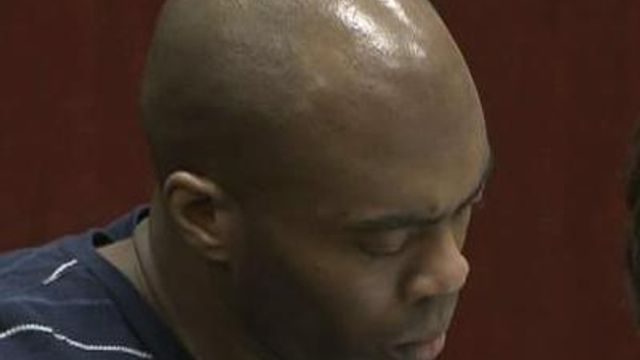Witnesses recall encounters with Cooper
Jurors spent about five hours deliberating before they found Samuel Cooper guilty on five counts of first-degree murder. Now, they must decide whether he should be sentenced to death or life in prison.
Posted — UpdatedCooper, 33, was convicted Tuesday on five counts of first-degree murder in the 2006 and 2007 shooting deaths of Ossama Haj-Hussein, LeRoy Jernigan, Timothy Barnwell, Ricky High and Tariq Hussain.
Prosecutors argued that Cooper shot four of the men in a series of robberies and went to great lengths to hide evidence linking him to the crimes. Ballistics evidence and a confession eventually linked him to the killings.
Jurors spent about five hours deliberating before they found him guilty. Now, they must decide whether he should be sentenced to life in prison or the death penalty.
They heard from numerous witnesses Wednesday, like Jeanette Grimes.
She was working as a front-desk clerk at a local Best Western on Jan. 31, 2007, when someone put a gun to her head and robbed her of $367.
"I was stunned," Grimes said. "What can you say when there's a gun to your head?"
She recalled that the robber was dressed in black with a facemask, revealing only his eyes. Besides putting the gun to her head, he never threatened her and never hurt her.
In fact, they talked for about five minutes. He asked her about her life and talked about his own life.
"I was ready for him to go, and he just kept talking," Grimes said.
Eventually, he asked her to help him find a way to leave so that he had enough time to get away before she could call police.
Demetrio Reyes Gomez, on the other hand, recalled how a shooting following a robbery in Reidsville left him in a coma for more than a month and cost him the use of his legs.
His life changed quite a bit since the Nov. 4, 2007, incident. He lost his farm job, and he isn't able to work. He relies on his wife to take care of him.
"I can't do anything, not even play with my children," he said.
Former Raleigh police officer Joseph Hunt recalled an encounter in 1999 when he and another officer stumbled upon and captured Cooper after he escaped from prison.
"Mr. Cooper looked me right in the eye and said, 'If I had a gun, I would've killed one of you,'" Hunt said.
Arthur Pastuszka was the closing manager at a Burger King on Glenwood Avenue in the early morning of Sept. 9, 2007, when two men entered a back door and robbed him of nearly $1,200. One of the robbers grabbed him, stuck a gun in his side and forced him to open the store safe.
The ordeal lasted less than three minutes, but Pastuszka said it seemed like an eternity.
He and the two employees working at the time lost their jobs for violating the restaurant chain's closed-door policy.
And Phillip Howard, a former investigator for the Wake County District Attorney's Office, recalled how he and several other court personnel had to fight Cooper to keep him from stealing a deputy's weapon during court one day in 1999.
It was a break in court, and Howard was talking to prosecutors when he heard a noise and then a scream.
He ran to the inmate holding area on the side of the courtroom, where he found Cooper standing above a female deputy, pulling her toward a holding cell where four or five other inmates were waiting.
"I immediately punched Mr. Cooper, and when I did, he fell forward," Howard said.
Cooper then went for the deputy's gun. Howard put him in a headlock while the deputy struggled to keep possession of her weapon. Eventually, other court personnel ran in to help.
"I could not control Mr. Cooper and make sure that the weapon was secure," he said.
Eventually, Cooper was detained and transported to back to the county jail.
More witnesses are expected to testify Thursday as the trial enters its second day of the sentencing phase. Prosecutors have characterized Cooper as a calculated, cold-blooded killer whose career was making money in robberies.
The defense is expected to present testimony that Cooper didn't understand the consequences of his actions at the time of the killings, because of childhood abuse that left him absent of any emotions and in a delusional state.
• Credits
Copyright 2024 by Capitol Broadcasting Company. All rights reserved. This material may not be published, broadcast, rewritten or redistributed.






